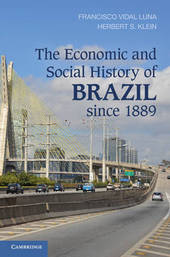
|
The Economic and Social History of Brazil since 1889
Paperback / softback
Main Details
| Title |
The Economic and Social History of Brazil since 1889
|
| Authors and Contributors |
By (author) Francisco Vidal Luna
|
|
By (author) Herbert S. Klein
|
| Physical Properties |
| Format:Paperback / softback | | Pages:454 | | Dimensions(mm): Height 228,Width 151 |
|
| ISBN/Barcode |
9781107616585
|
| Classifications | Dewey:981.05 |
|---|
| Audience | | Professional & Vocational | | Tertiary Education (US: College) | |
|---|
| Illustrations |
10 Tables, unspecified; 6 Maps; 162 Line drawings, unspecified
|
|
Publishing Details |
| Publisher |
Cambridge University Press
|
| Imprint |
Cambridge University Press
|
| Publication Date |
31 March 2014 |
| Publication Country |
United Kingdom
|
Description
This is the first complete economic and social history of Brazil in the modern period in any language. It provides a detailed analysis of the evolution of the Brazilian society and economy from the end of the empire in 1889 to the present day. The authors elucidate the basic trends that have defined modern Brazilian society and economy. In this period Brazil moved from being a mostly rural traditional agriculture society with only light industry and low levels of human capital to a modern literate and industrial nation. It has also transformed itself into one of the world's most important agricultural exporters. How and why this occurred is explained in this important survey.
Author Biography
Francisco Vidal Luna received his PhD in Economics in 1980 from the Universidade de Sao Paulo in Sao Paulo, Brazil, where he also was Professor of Economics until 1997. Author of some 50 articles and papers and 11 books on Brazilian economic history and the Brazilian economy, he has been an academic, a government administrator, and a banker. Herbert S. Klein received his PhD from the University of Chicago in 1963 and is Gouveneur Morris Professor Emeritus of History at Columbia University. Author of some 25 books and 165 articles in several languages on Latin America and on comparative themes in social and economic history, he is currently a Research Fellow and Latin American Curator at Stanford University's Hoover Institution.
Reviews'Brazil ... [is] already the seventh largest economy in the world and is poised to become the fifth largest by mid-century. And yet, to foreigners it remains a broadly exotic country ... Part of the reason why [it] remains a known unknown to the world at large is the lack of an authoritative account of the historical trends that have defined modern Brazilian society and economy. With the publication of [this book] this will no longer be the case. Eminent economic historians [Luna and Klein] provide a detailed analysis of the evolution of Brazilian society and economy from the end of the empire to the present day. Led by the fluent prose and the deep knowledge of the authors, readers will marvel at the deep changes that have occurred in more than a century of Brazil's history and at the extraordinary position in which the nation now finds itself ...' Edmar Bacha, Casa das Garcas Institute of Economic Policy Studies 'Economists and politicians who like to talk about crisis and performance must read this book. It puts together with rigor and completeness the history of Brazil for the last 150 years and provides the data on the economy, the demography, the urbanization, and much more that social scientists need to understand the development of Brazil today. It is a valuable contribution by two well-known historians.' Joao Sayad, University of Sao Paolo 'Beginning with the abolition of slavery, the authors guide the reader through the evolution of modern Brazil from the end of the empire to the present, using economic growth to explain social and political developments. The book's value is that trends and tendencies are carefully tracked to show contemporary Brazil as a logical continuation of social and economic developments of the past - not a series of different, often disconnected events as is occasionally suggested in books focused on politics and government. For the beginner, the book may be challenging because the political story is not its prominent feature. This volume is an important publication for faculty, students and readers interested in the deep changes that have occurred in more than a century of Brazil's history. Summing up: recommended.' M. L. Grover, Choice
|